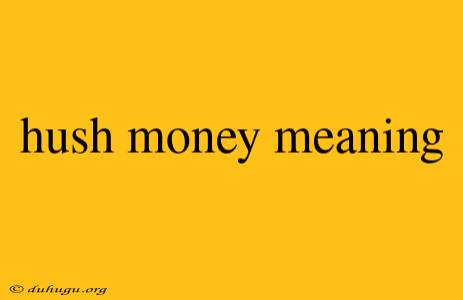Hush Money Meaning: Understanding the Concept
What is Hush Money?
Hush money is a term used to describe a payment or bribe made to an individual or entity to keep quiet about a particular issue, scandal, or wrongdoing. It's often used to silence someone who has discovered information that could be damaging to another person, organization, or business. The payment is typically made in exchange for their silence, and it's often done in a discreet and secretive manner.
** Origins of the Term**
The term "hush money" originates from the 17th century, when it was used to describe a payment made to silence someone who had discovered a secret or wrongdoing. Over time, the term has evolved to encompass a broader range of situations, including bribery, extortion, and corruption.
Examples of Hush Money
Hush money is often used in high-stakes situations, such as:
- Celebrities and Public Figures: To silence individuals who have discovered damaging information about a celebrity's personal life, such as infidelity or illegal activities.
- Corporate Scandals: To silence whistleblowers who have discovered evidence of corporate wrongdoing, such as fraud or embezzlement.
- Political Cover-Ups: To silence individuals who have discovered evidence of political corruption or wrongdoing.
The Ethics of Hush Money
The use of hush money raises serious ethical concerns. By paying someone to keep quiet, individuals or organizations may be attempting to cover up wrongdoing or avoid accountability. This can perpetuate a culture of secrecy and corruption, and undermine trust in institutions and individuals.
Legal Implications
The use of hush money can have serious legal consequences. In many cases, making or accepting a hush money payment can be considered bribery, which is a criminal offense. Additionally, attempts to silence someone through hush money payments can be seen as obstruction of justice, which is also illegal.
Conclusion
Hush money is a common tactic used to silence individuals who have discovered sensitive information. However, it raises serious ethical and legal concerns. It's essential to promote a culture of transparency and accountability, where wrongdoing is exposed and those responsible are held accountable.
